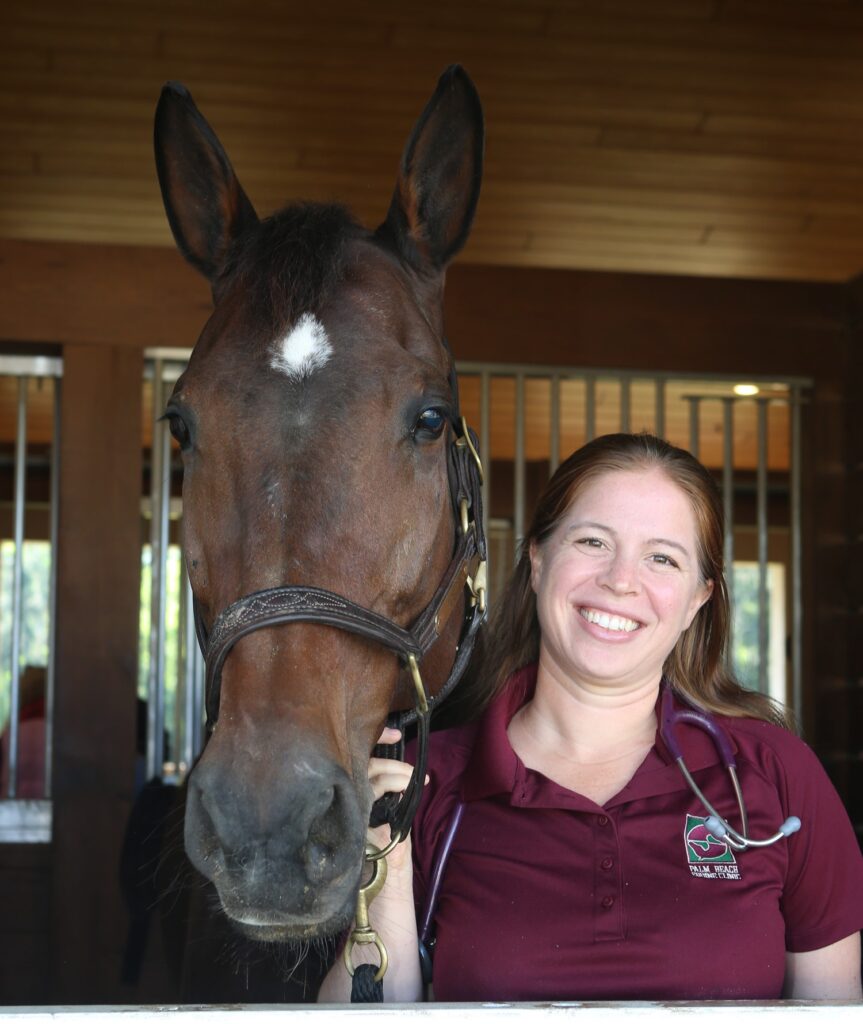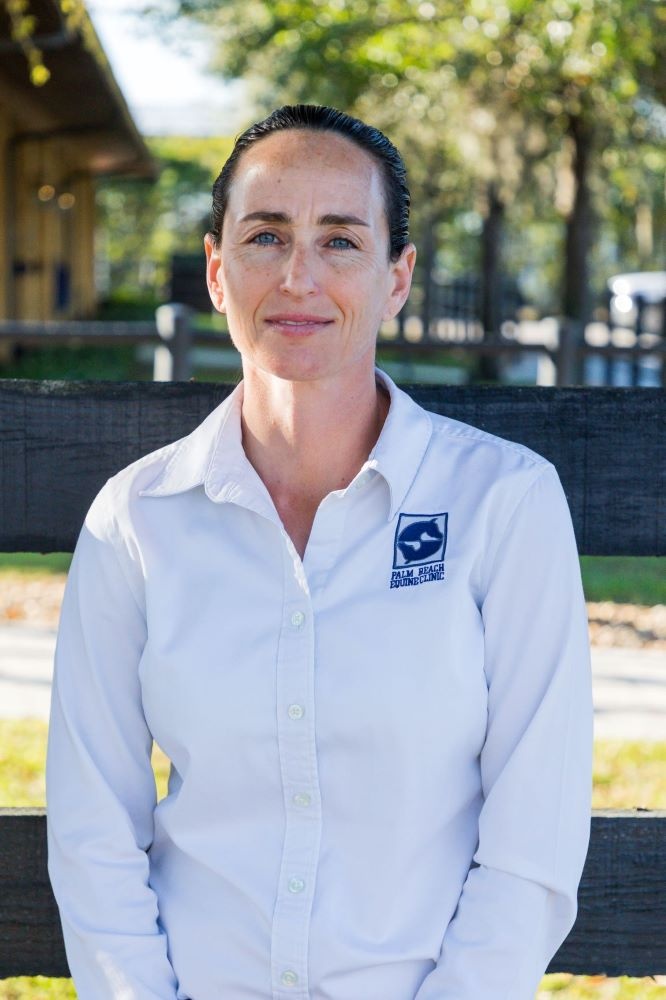Tag: lewis
5 Questions for Dr. Jordan Lewis

Dr. Jordan Lewis is a graduate of the University of Florida College of Veterinary Medicine and has dedicated her professional career to serving her home state. Dr. Lewis grew up with horses and completed an internship in equine medicine and surgery at the Equine Medical Center in Ocala.
Get to know Dr. Lewis:
1. What is your background with horses?
I moved from New York City to Fort Lauderdale, FL, when I was eight years old. My dad grew up loving horses, and when I was two, he bought a horse. We would travel from our home in New York City to visit him in the Pocono Mountains every weekend to ride. My first experience on a horse was riding double with my dad through cornfields. When I was eight years old, we moved to Florida and I was lucky enough to get my own pony. I got totally hooked on horses and I competed on the Arabian circuit as a teenager.
2. What inspired you to pursue veterinary medicine?
As a child, I participated in local 4-H programs and had the experience of touring an equine surgical and rehabilitation facility. I realized early that this was exactly what I wanted to do as my career.
3. When did you join Palm Beach Equine Clinic and what is your specialty?
I joined the team at Palm Beach Equine Clinic in June of 2005. I love the fact that we have such a dynamic team of veterinarians to work with and consult on difficult cases. I wouldn’t say I have a main focus as I am able to do everything from sports medicine and lameness exams to reproduction work thanks to the clinic’s wide range of cases and capabilities.

4. What advice would you give someone who wants to become an equine vet?
I would tell them that a career in large animal veterinary care is not just a job, it is a lifestyle. If it is what you are meant to do, you will love every minute of this lifestyle. I get to be outside and around horses all day. For me, this is the greatest profession.
5. What is one of the most interesting cases you have worked on?
The most interesting case I have worked on was a pericardial effusion. The condition is caused by excess fluid between the heart and the sac surrounding the heart, known as the pericardium. To remove the fluid, I performed a pericardiocentesis, which involved placing a drain within the sac around the heart to drain the excess fluid and relieve pressure on the heart. That is not something you get to do every day!
As more and more international-level sport horse competitions are brought to North America, the import and export of equine athletes overseas has increased significantly. Moreover, with the winter show season in Florida, horses from around the world are about to make a pilgrimage to South Florida.
Either for a purchase or regularly scheduled show-season travel, Dr. Jordan Lewis of Palm Beach Equine Clinic works with Florida state veterinarians to simplify the process of importing and exporting horses to and from international destinations.

Where to Begin
The transport process begins with obtaining travel documents, including an equine passport and health certificate, and organizing travel arrangements with a professional equine shipper. Once travel is organized, checking the horse’s health is suitable for traveling is always the top priority.
“The most important thing to have in order is health records, up-to-date vaccinations, and complete preventative care,” said Dr. Lewis. “Much of the testing upon import and export depends on the outbreaks of different diseases in the import and export countries. The requirements change year to year and even month to month.”
Dr. Lewis is one of the many veterinarians at Palm Beach Equine Clinic who helps owners navigate through the ever-changing import, export, and quarantine regulations.
Requirements Differ Depending on the Specific Import and Export Countries
“Most horses that are coming from Europe to the U.S. to compete in Florida fly into Miami and are placed in a two- or three-day U.S. Department of Agriculture (USDA) quarantine depending on the country they are arriving from,” said Dr. Lewis. “If they are arriving from South America, however, requirements are different and they will spend seven days at USDA in Miami.”
It is there that the most current regulations are upheld and tests are performed to rule out the presence of any threatening diseases.
When importing to the U.S., Dr. Lewis affirms that many tests are required through bloodwork, including equine infectious anaemia (EIA) or coggins; piroplasmosis, which is a tick-borne disease; glanders, a common bacterial disease; and dourine, a parasite-born venereal disease. When traveling from South America, horses are also tested for other parasites, such as screw worms. When exporting from the U.S., testing will vary based on the regulations of the destination country, its current health precautions and common parasites or diseases.
CEM Quarantine
Once the initial quarantine is complete, geldings are released into the general population, while stallions and mares are transitioned to Contagious equine metritis (CEM) quarantine at either a commercial or private quarantine facility.
CEM is a venereal disease in horses caused by bacteria and is only spread during breeding or through infected semen during artificial insemination. CEM quarantine is recommended for all horses entering the U.S. from Europe, but not necessary for those flying in from South America as the disease is not present in those countries.
According to Dr. Lewis, CEM quarantine takes about 15 days for mares and 35 to 40 days for stallions. Taking this into account, she recommends owners plan a month to complete the travel regulations for a mare and two months for a stallion. Horses that are continually showing obviously don’t have this time built into their travel schedules, and that is where waiver tents enter the equation.
Mares and stallions that bypass CEM quarantine are shipped in a sealed trailer to the competition facility where they enter quarantine in a waiver tent to keep them secure from the general horse population while competing.
If horses are admitted into a traditional CEM quarantine, veterinarians like Dr. Lewis perform the appropriate tests and cultures that clear a horse for approved release into a new home or to the event.
“We work very closely with state veterinarians to do all the blood draws and testing for imported horses, as well as stay on top of the requirements of export countries so each horse can easily and safely transition into the equine population,” said Lewis.
While requirements may change often, the ultimate goal of veterinarians like Dr. Lewis and her colleagues remains the same: releasing safe, healthy, and happy horses to travel into the U.S. and all countries around the world.
A leader in sport horse medicine, Palm Beach Equine Clinic (PBEC) is a mainstay in the equestrian-centric Village of Wellington in South Florida. Known as the ‘Winter Equestrian Capital of the World,’ Wellington welcomes equestrians from around the globe to compete. Palm Beach Equine Clinic is the Official Veterinarians of events such as the Winter Equestrian Festival (WEF) and the Adequan® Global Dressage Festival (AGDF). PBEC is dedicated to providing exceptional care to the horses and equally committed to strengthening relationships within the local community.
PBEC President Dr. Scott Swerdlin strongly encourages his veterinarians to share their expertise and get involved in philanthropic community relations in Wellington. Many of the veterinarians generously donate their time and energy to many different projects throughout the community each year.
Official Veterinarians of Vinceremos Therapeutic Riding Center
One local organization that PBEC annually supports in various ways is Vinceremos Therapeutic Riding Center (VTRC). Vinceremos Therapeutic Riding Center is a 501 (c) 3 not-for-profit corporation that provides therapeutic horseback riding to those with disabilities and hippotherapy in Palm Beach County since 1982. Dr. Swerdlin sits on Vinceremos Therapeutic Riding Center’s Board of Directors and also serves on the organization’s Executive Committee.
“Vinceremos is an exceptional organization,” Swerdlin stated. “There is nothing that you can possibly do that will make you feel better than spending time at Vinceremos and being involved in that organization. It is horse oriented, but what they are doing is providing solutions for children who are disabled. The way they light up and how excited they are to be on those horses is amazing to see. All of a sudden, that disadvantage disappears. You see it in their faces, you see it in their smiles. And, you see it in every aspect of their well-being. To see the improvement in the health and the capabilities of these children is amazing.”
Team Effort
All of the doctors at PBEC have been involved with Vinceremos Therapeutic Riding Center in some way, but two women who have gone above and beyond for the program are Dr. Janet Greenfield-Davis and Dr. Jordan Lewis.
“Janet just had her second child and Jordan just had her first child, and they both put a lot of time and energy into helping other children,” Dr. Swerdlin noted. “What I try to do is coach a philosophy, and that philosophy is how fortunate we all are to be here in this community taking care of these kinds of horses and clients, and that we owe something back. We need to appreciate what we are doing and try to give back to the community.”
For Dr. Greenfield-Davis, donating her time and expertise at Vinceremos Therapeutic Riding Center is fun and rewarding work. She serves as the primary veterinarian to VTRC, treating the horses on an as-needed basis and helping with pre-purchase exams and evaluations of donated horses. As Official Veterinarians, Palm Beach Equine Clinic offers the talents and knowledge of all its doctors, who are called upon when needed.
“It is a spectacular program,” said Dr. Greenfield Davis. “I have been working with Vinceremos for the last four years, and I have learned so much. What they provide is a huge benefit for those kids. Even the kids who volunteer that are shy or have communication problems, they, too, just blossom there.
“I think it is important for us to give back to the community,” Dr. Greenfield-Davis added. “We are a rather large fixture in the community. We are one of biggest equine hospitals in the area and for us to help and contribute to their program is important for all of us.”
She continued, “Everybody at the clinic has been there at one point or another; everybody chips in. The clinic foots the bill for all of the horses there and all of the official veterinarians and surgeons donate their time and services. It is fun, too. They invite us to their horse shows and events, and we all have a good time.”

Additional Charity Involvement in Wellington
In addition to PBEC’s contributions with VTRC, the clinic donates to JustWorld International, an organization of equestrians funding and sustaining education, nutrition, and health programs for children in Cambodia, Guatemala, and Honduras. PBEC has supported JustWorld International since its inception.
Other charitable work includes donations to the Great Charity Challenge, presented by Fidelity Investments® (GCC), which is hosted each year during the Winter Equestrian Festival. The pro-am team competition has distributed more than $7.5 million to over 150 nonprofits in Palm Beach County over the last six years. Founded in 2010 by Equestrian Sport Productions CEO Mark Bellissimo and his daughter Paige, the Great Charity Challenge has seen the equestrian community take charitable giving to a new level through their love of horses. PBEC is proud to be a part of such a fantastic event.
“The Great Charity Challenge is so much fun. You see these riders just barreling to try to win for their charity,” said Dr. Swerdlin. “Vinceremos was chosen (as a charity recipient for the GCC) this year, so we are very excited and hope to have a big turnout. I enjoy the competition and the mystery of who is going to win and what the charities will get. The way they have it devised so that it is such a win-win for all of the charities is wonderful. It is just fun for everybody, and it is such a good cause.”
Local Veterinary Educational Opportunities
Official Veterinarians for Wellington High School Equine Pre-Vet Program
Education of the public is also on the forefront of PBEC’s community involvement. Currently, through Wellington High School’s (WHS) Equine Pre-Vet Program, PBEC has a hands-on program for students looking to pursue a career in veterinary medicine.
Wellington High School seniors that choose to pursue the Equine Pre-Vet Program have a wealth of knowledge at their fingertips with one of the most advanced equine medical centers just down the road. Through the program at WHS and the generosity of the veterinarians at PBEC, students in the Equine Pre-Vet Program have the unique opportunity to learn all about the profession by shadowing the very best.
Knowledge from the entire Veterinary Team
Dr. Janet Greenfield-Davis is also very involved with this program and mentors the senior students. “We try to play an active role in our community, and we really enjoy having the kids visit the clinic,” Greenfield-Davis stated.

Dr. Swerdlin added, “We have board certified radiologists, we have three boarded surgeons, we have boarded internal medicine veterinarians, and we have boarded
radiologists, we have three boarded surgeons, we have boarded internal medicine veterinarians, and we have boarded ophthalmologists. We also have the most high-tech diagnostic equipment, so for a young veterinarian, PBEC is paradise. We like spending the time to teach American veterinarians as well as foreign veterinarians. I think we are improving the success and the health of horses all over the world by offering those opportunities.”
Palm Beach Equine Clinic enjoys getting involved in the community and looks forward to continued involvement in 2016. Palm Beach Equine Clinic provides experience, knowledge, availability, and the very best care for the horses of Wellington. Have them be a part of your team! To find out more and speak with an official veterinarian, call 561-793-1599.
